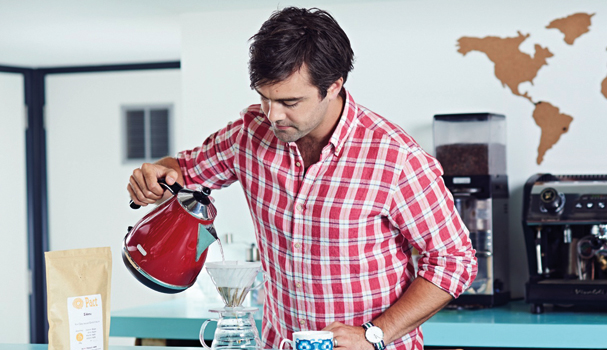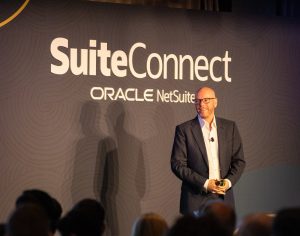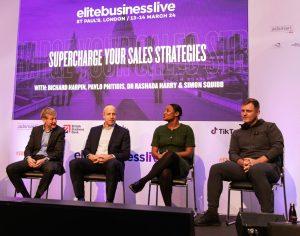If you’re anything like us Elite Business journos, the day can’t begin without a cup of the black stuff. Along with millions of other Britons, coffee is part of our daily ritual but in a continent of connoisseurs the UK is barely scratching the surface when it comes to consuming the good stuff. Our market – a third the size of Germany’s – is still heavily saturated with instant. Pact Coffee is on a mission to change all that. “We want to get people drinking better coffee by making incredible, freshly roasted beans accessible to everyone,” says Stephen Rapaport, founder of Pact. Its world-class coffee is from dedicated farmers, roasted in small batches in Herefordshire and shipped within seven days.
In 2012 – the same year the coffee market broke the £1bn barrier in the UK – Rapaport began the daily grind of selling coffee via post from his kitchen. “For the first six months, it was just me alone with a load of felt tip pens, sealing bags of coffee with hair straighteners,” he says.
Not just a seasoned coffee drinker but a seasoned entrepreneur, Pact is Rapaport’s fourth business. His last business, Crashpadder sold to Airbnb but it wasn’t long before he was champing at the bit to launch another start-up. “It was never a question of whether I’d start another business but what and when,” he says. His wife encouraged him to take up life in the espresso lane by telling him: “stop thinking like a venture capitalist and do the thing that you love”. And Rapaport loves his coffee.
A year and a half into his love affair, he moved out of his kitchen and took on his first employee. “It’s grown pretty quickly and we now have 35 full-time staff.” Central to success is head of coffee, Will Corby, who is an award-winning barista. Corby flies out to meet farmers around the world to compete for the best beans available. On his most recent trip, sitting across the table from a farmer in Brazil, he negotiated the sale of 45 tonnes of green, unroasted beans. “Coffee is very stable in that form,” explains Rapaport. Corby is so passionate about what he does that when he’s not jet-setting you can usually find him selling coffee at a market stall in his native Cardiff.
It’s a common misconception that ‘good coffee’ is synonymous with ‘expensive coffee’. Pact sells its wares at reasonable rates and still guarantees farmers at least 125% of the fair trade rate; in fact, last year the company paid a whopping 149% average, which is more than what supermarkets pay. “The fair trade movement is terrific but it’s no longer something that an ethical business should aspire to. It’s a bit like the minimum wage; no one proudly says they pay it,” explains Rapaport. “What we’re doing is creating a new gold standard for ethical, sustainable sourcing in the coffee trade. If we can have a small impact on a corner of this enormous industry then I can die a happy man.”

Pact also differs from the traditional supermarket brands in its roasting methods. “What you buy in a Tesco is commodity-grade coffee – a blend of all the different coffees that didn’t sell because of their low quality. It’s all roasted very dark because that ensures they have the same uniform taste month after month,” says Rapaport. Dark roasts are essentially burnt and Pact prefer to keep things light. “A light roast allows us to highlight the unique flavour characteristics of each coffee. Flavour is as much of an art form as painting or music and with coffee it’s as good as it gets,” he says.
We’ve sampled some of Pact’s blends, including its delectable Finca San Luis bread and butter pudding and vanilla custard. It’s just one of many flavours Pact has to their name, which are rotated on a monthly basis. “The coffee that we sell is highly seasonal and we have six blends on offer at any one time,” says Rapaport. “A great cup of coffee can change the way you approach the day and the public are being robbed of a very beautiful experience and we want to stop that,” he adds.
At the heart of what Rapaport and his team do are the customers. “A lot of businesses claim that to the extent it’s almost become white noise but our customers actually do tell us which coffees to buy and how to roast them,” he explains. When you buy Pact’s coffee, a member of the community team will call you to discuss your experience and offer advice on getting the most out of your coffee. All customer feedback is taken on board.
With customers in mind again, Pact has a unique approach to subscriptions. “I look around and see a lot of people selling quality food and drink on a rigid subscription; you give them X amount of money per month and they give you Y amount of products. So many lazy entrepreneurs and naive investors see it as a source of recurrent revenue but customers hate subscriptions,” Rapaport says. “There’s an anxiety that when signed up to a subscription it won’t be long before they’re paying for something they didn’t want and we’re not in the business doing that.”
Pact has a much more flexible and customisable plan. There are two basic options: coffee delivered once a week or once a fortnight but this can be changed to as regular as you like. However, if a customer finds themselves low on beans they can hit a ‘panic button’ and receive some the next day and their regular delivery will be adjusted accordingly. What’s more, customers can delay a batch if they still have a decent supply left. “Our real challenge is to keep people in the sweet spot of 50-200g in their cupboards at all times, so whether you’re in central London or the Outer Hebrides, you never need be without,” says Rapaport.

This is all down to Pact’s excellent web development team, which includes an artificial intelligence PhD, David Toth, who is Pact’s official data scientist. Toth has developed a multi-layered algorithm to learn customer palates. All the customer needs to do is input how they take their coffee, what their preferred method of brewing is and whether they liked or disliked their last batch. Rapaport guarantees that the customer will enjoy their next batch of coffee more than their last; customers don’t need to know that because they take milk in their coffee they probably wouldn’t like something highly acidic, which means avoiding anything from Tanzania –it’s all done automatically. “Technically, it’s sensationally difficult to pull off but I’m really proud of the fact we’ve done it,” Rapaport says.
Another unique feature is on each pack of Pact coffee you can see when the beans have been roasted and packed, which is a real guarantee of freshness. It could be roasted on a Monday, packed on a Wednesday and be part of your breakfast on the Thursday. It really is no wonder why the brand is proving so popular – and investors have taken notice.
“We raised half a million pounds seed capital shortly after launching and £2.2m series A early this year,” Rapaport explains. He has also recently been hosted at the House of Commons after winning the first ever Investec Food & Drink Entrepreneur of the Year award. “I also won the drinks category and came second in two others; we were the only business to feature more than once, which has been a fantastic boost to morale for the team,” he says.
But even with all this success, you won’t be seeing Pact on the supermarket shelves anytime soon. “We will remain postal because it allows us to get to know every one of our customers. Traditional retail removes you by one step from your customers and as soon as you’re on the shelf at Tesco, then the biggest and most important customer you have is Tesco,” says Rapaport.
However, he isn’t dismissive of big players as a rule; it may be surprising to hear that he enjoys drinking in Starbucks. What may be less surprising is it’s their earl gray tea he’s a big fan of. “It’s become really fashionable to bash Starbucks but those that do ignore the company’s extraordinary achievements,” he says. Starbucks arrived on UK shores in 1998 and led to mainstream coffee shops proliferating on the UK high street. It provided customers with much tastier freshly ground coffee. “As an organisation I respect Starbucks enormously; 15 years ago they achieved what we are trying to achieve now – they upgraded everybody in the world’s coffee habits but they haven’t kept pace with consumer taste and I think there’s an opportunity to do that again.” With Pact, Rapaport wants to recreate this phenomenon. “We hope to upgrade everyone’s coffee taste.” ![]()
Share via:


















































